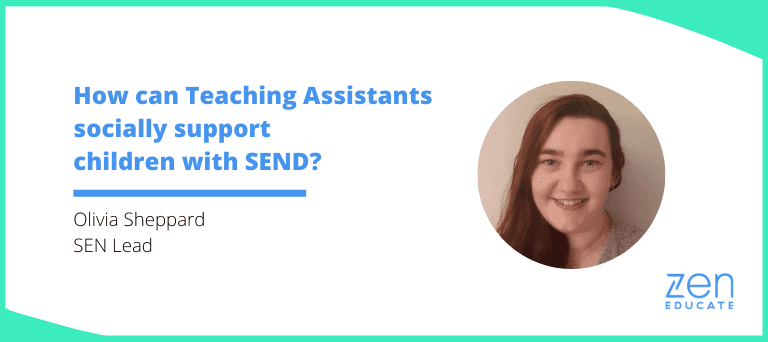Olivia Sheppard
18 Nov 2020
5
min read

Having a strong friendship group can be a huge factor in protecting children against bullying. But even the most well-intentioned Teaching Assistants have to consider whether they’re supporting or inhibiting children with SEND from making these vital social links. As part of Anti-Bullying Week 2020, Zen’s SEN lead, Olivia, suggests some ways TAs can help.
While many children and young people find support from Teaching Assistants helpful in making friends, some have expressed that having a TA has done the opposite: hindered their ability to form friendships with their peers. Having a secure friendship group is one of the most notable protective factors against bullying, so what can TAs do differently to ensure they aren’t isolating children from their peer groups?
A report from the Anti-Bullying Alliance has shown that around:
12% of children with SEN reported being bullied before age 7, compared to just 6% of their peers.
62% of children who went on to access Child and Adolescent Mental Health Services (CAMHS) said bullying was one of the main reasons for needing support.
The benefits of specialist support
Teaching Assistants (TAs) or Learning Support Assistants (LSAs) are critical in supporting children and young people in schools. While their main focus is helping improve academic attainment and delivering therapies, TAs and LSAs can facilitate social development as well.
Many children and young people say having a TA in their class makes them feel confident in accessing learning activities adapted to meet their individual needs. Having a TA can also make children feel safe in school because a TA being there gives them one consistent person in school to talk about personal issues and difficulties with, including bullying. Some ways of enriching a child with SEND’s learning experience as a TA include:
breaking lessons down into accessible chunks
incorporating sensory and movement breaks for children who are easily overwhelmed
delivering individual therapies to support speech and language, physical movement or emotional support.
Encouraging positive friendships
Children and young people with SEND have reported or have been observed to be largely taught away from the rest of the class, sometimes on a one-to-one basis. This can make children feel withdrawn from their peers and mark them out as 'different'. For some, this isolation causes them to feel wary of approaching others to make friends.
Instead, TAs could encourage students with SEND to take part in group activities in the classroom, where possible, to help them integrate with the rest of the class. For example:
When working with children who are non-verbal, find alternative ways for them to communicate ideas and thoughts to the group, such as a Picture Exchange Communication System (PECS) or a whiteboard.
During group projects, have the child take ownership of a task they can complete for everyone in the group. For example, on a craft project with younger children, this could be something like glueing or cutting out.
This way, the child will feel a greater sense of achievement and integration compared to completing a whole task isolated from the rest of the class.
While a child with SEND may need support in accessing learning materials in the classroom, they could be capable of playing either independently or with other children in the playground. There may be some children who need gentle encouragement to play with others and may benefit from some independent play away from their TA.
Delegating tasks
Another way in which TAs or teachers can help children with SEND integrate into the class is by giving them class responsibilities where appropriate. If there is an opportunity for a child to hand out snacks or books, support that child in picking 1 or 2 other children in the class to help out. This can help facilitate relationship building and communication between peers.
Pairing children up appropriately
Finally, it’s important to encourage staff to be mindful when pairing children up for work. Ensure groups are created based on common or mutual interests, as well as academic ability. Having something in common to talk or communicate about will help children with SEND feel safe. For many, particularly for children with autism who often have a fascination with a certain topic, being able to speak about their passion with a fellow classmate can help them to develop their social skills and self-confidence.
It’s crucial that everyone in a class understands and values disability and difference. By minimising isolation from others, delegating tasks for group activities and fostering connections between children with mutual interests, Teaching Assistants can help children with SEND develop the friendship groups they deserve and protect them from bullying.


